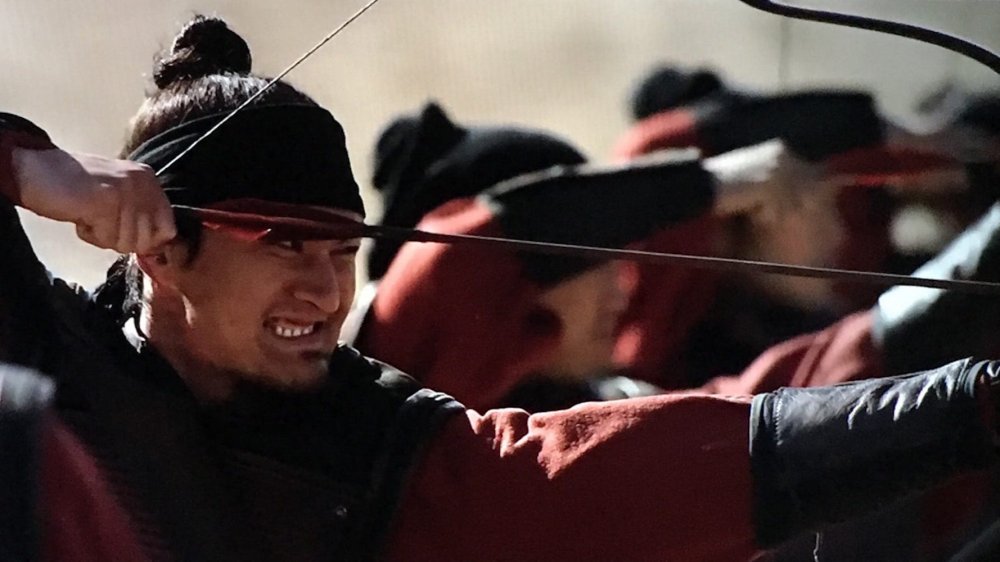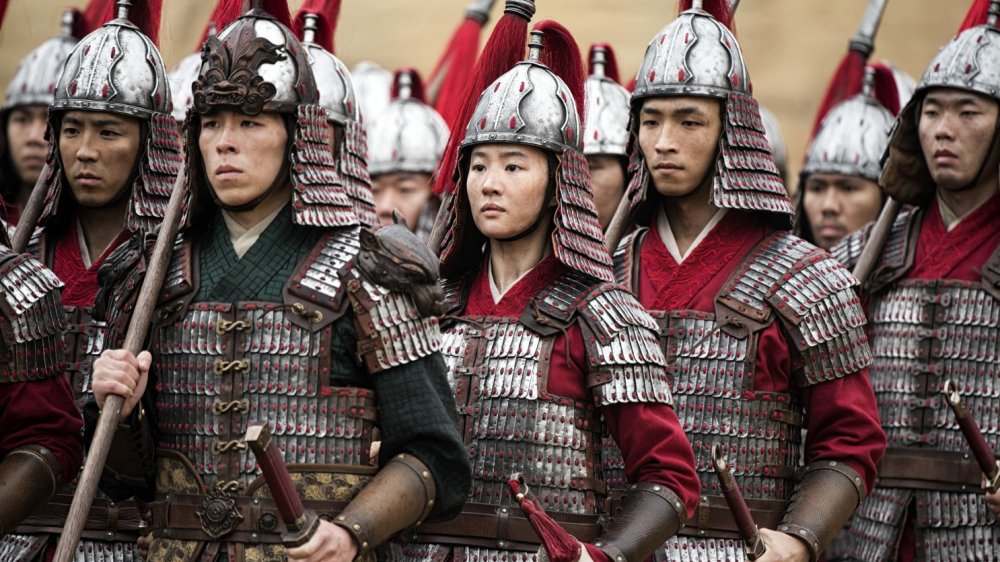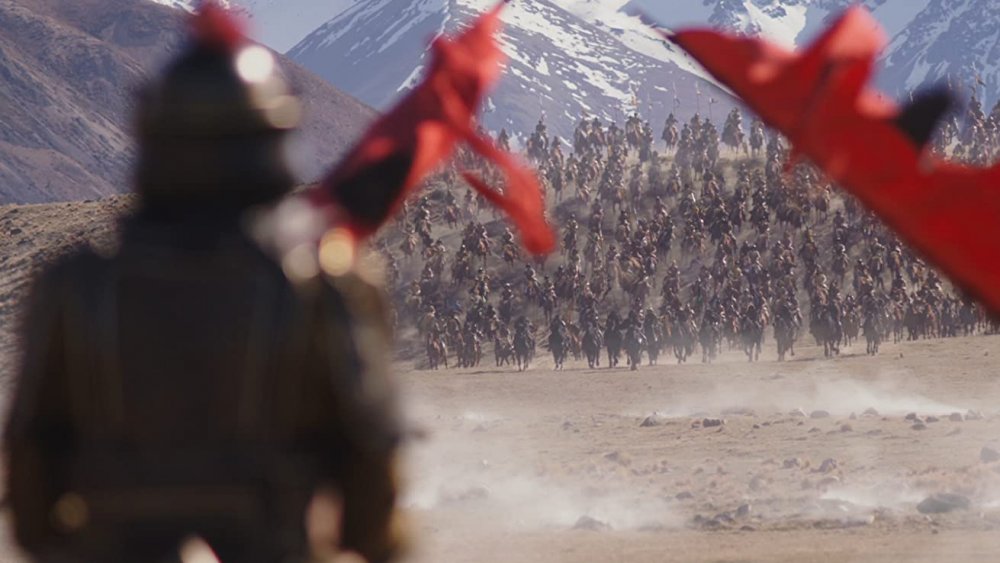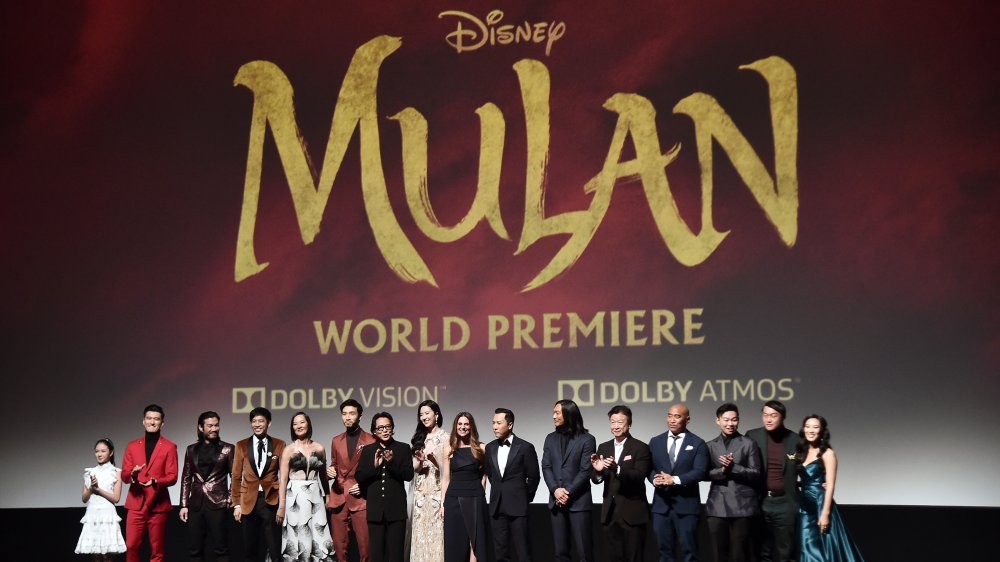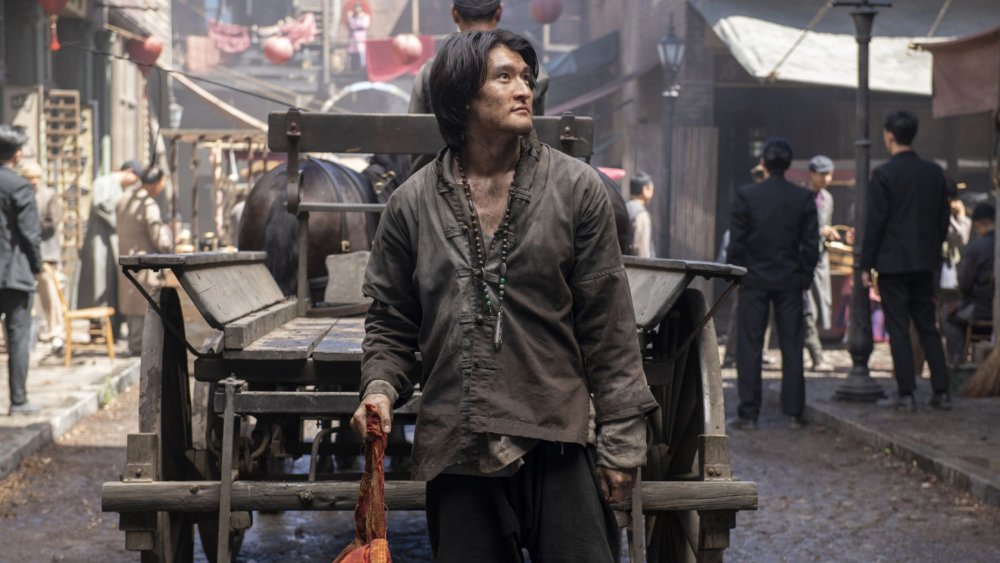Actor Chen Tang Talks Mulan, Warrior, And More - Exclusive Interview
While not many of us can be said to be having a great 2020, actor Chen Tang's year has, at least on a professional level, borne some impressive fruit. First, he had the chance to appear in Disney's live-action adaptation of Mulan. Originally slated to be one of the studio's tentpole theatrical releases, the film was released on streaming service Disney+, but with no shortage of accompanying fanfare. In it, Tang plays Yao, a wise-cracking squadmate of the title character, and had the opportunity to work alongside industry legends like Donnie Yen.
As the year heads into its home stretch, fans of Tang's work also have the opportunity to catch him in season 2 of Warrior. The Cinemax historical drama, inspired by an original concept from martial arts legend Bruce Lee, tells the story of Chinese immigrants in 19th-century San Francisco, and as befits its origins, seasons its character-driven storytelling with lots of exquisitely choreographed action. As the show heads into its second go-'round, Tang hops on board as Hong, a baby-faced assassin from Qing-dynasty China.
With everything he has on his plate, Looper was grateful to have the opportunity to sit down with Chen Tang and discuss what it's like being part of a such a high-profile remake as Mulan, and the collaborative process that informed both his stunt and character work on Warrior.
Mulan makes a military out of Chen Tang and its cast
What drew you to Mulan?
Oh, my god. It's Mulan. I know that sounds simplistic, and I mean that in the best way. For me, with my Chinese heritage, we grew up listening to this legend. This is our Joan of Arc. So as soon as I heard that Disney was doing a live-action Mulan, I think just about every Asian actor out there had their antennas up. And of course, when I ended up doing it, it was just great to see Disney be so gung-ho about throwing all of their weight into it to get it just right. I mean, there must have been like two or three years of pre-production just to make sure all the details, all the research, everything was just right. I guess, in a one-sentence answer, it's just an opportunity to live in my culture's history and bring that to the screen. It's a great honor.
Let's talk about the cast a little bit, because there are some really heavy hitters in this film. Can you talk a bit about what it was like working with the cast, and whether there were any favorite on-set moments?
You know, obviously with all of these legends of Asian cinema, I'm over here, we're in the same trailer park, we see them from my trailer to theirs. It's brilliant. First off, it actually was really fun for me to see how down to earth everybody was. They're like, "Hey, what's up? I'm your general." So it was really enjoyable to just be able to play with them. But as far as the deepest connections I had, that was with what we called our squad, which is Mulan and her soldier buddies, mostly by the fact that we just spent half a year together... Niki Caro, the director, was very adamant about getting us sort of a bootcamp together, not only to get our bodies and our minds in shape for what she wanted to see on camera, to get us into the world, but also to give us that camaraderie that one can only really get through suffering on 13-kilometer runs together. And so I think the closest connections that I had were with just my soldier buddies, Ling and Po in particular.
Can you tell us a bit about that training regimen, and what went into forming that unit?
Oh my goodness. You know, I grew up playing sports all my life, and I don't think I've ever had physical training that intense. We got there in New Zealand, and within a few days, they were like, "Get into the van. We're going to boot camp." So we went to bootcamp. And our trainer was an ex-Serbian Special Forces guy who also worked for the English Premier League as a trainer as well. He's a magnificent trainer, his name is Bojan. And Bojan basically said, "You know what? We need to turn all of you little, soft actors into farmer, laborer, conscript soldiers in the sixth century A.D."
First off, it was non-stop running, hours a day, every single day. Non-stop running, and then a lot of calisthenics. A lot of what felt sort of like manual labor stuff, just moving heavy objects, bringing them out, bring them back in, picking each other up, running with each other. Just pushing sleds, moving heavy objects. Just constantly, no rest. That was every day, and then we had horseback riding, we had army marching, spear and shield fighting. Stunts, just because it was a lot of stunt-heavy stuff. Fight training, even things like Chinese archery, because all of us had to be able to shoot a bow. Just to get us into the world, you know?
Was there a great deal of attention paid to the period accuracy of the martial training?
Very much. We actually had a military historian come, and he said, "You know what, Tang dynasty, right around that time, medieval China, we're not fully sure about the specifics of exactly how they fought." So we took a little bit of artistic leeway with that, but it was quite accurate. A lot of in-formation marching, a lot of in-formation, basically you have a shield and a spear, and then how do we get into formation like that, and stand a cavalry charge, things like that.
Who among the cast would you say took best to the soldiery?
Can I say myself? No, seriously though, I actually think every single one of us was pretty gung ho about it, but I have to probably single out Yoson An, because this is our leader amongst men. Honghui is the love interest obviously, but I think he really... he'll probably kill me, but I saw him grow from this boy and find that strength within himself, through the training, through all the camp, through all the camaraderie with us, into just, "Oh yeah, this is somebody I would follow into battle."
You mentioned his abs on Instagram.
Oh yeah. Well, we all got into fantastic shape, probably the best shape of all of our lives, but as far as him, he was, I think, the only specific one for whom it was, "I don't care how it happens, but you need to look this particular way," because he had those shirtless scenes and all these things, and he's just this sexy love interest, and so he kind of went down the rabbit hole with that. There were days where he was pretty dehydrated, really going on that diet.
Making Mulan's epic battle scenes
We've seen a lot of movies with big battle scenes. What's something that you would say people looking from the outside wouldn't necessarily get about what it takes to put a scene like that together?
I think most people nowadays are used to seeing this CGI thing. You see a giant army, like a 150-person army, or section of an army, and you think, "Okay, they'll just take a couple of people in there. They'll probably just add it in with CGI." No, on ours, it was mostly practical. Because they had to make an army, they had a casting and a callback and a movement callback for the 150-strong background army, and then they gave them their own training camp, a couple of weeks training camp. We worked with them, they had their own squadrons and divisions and everything.
What you see on the screen, that is it. They're all there. And I think what a lot of people probably don't realize is just the amount of teamwork it actually takes to actually shoot something like that. The entire time, we were all lined up in the South Island. It's freezing because it's winter, and we're just standing there, and they have to make it just right, just to get that nice shot. They have to put all these giant fans on us, so it's even more freezing. So I think most people, they see it, "Oh wow, it looks really, really cool. It looks amazing." We're really there.
Whether it's a battle scene or something else, was there a scene in particular in the film that you really relished shooting? What was your favorite part?
It's probably got to be that epic battle where we line up and meet the Rouran army for the first time, if only because most of it was all on location, and we are there in the glaciers, in these mountains — mountains as far as you can see, and you are just there, and it started snowing a little bit. It was just, for me, that's what I think what an actor dreams of, just being so in it that you're just lost in it. How can you not be? We're all in armor, we're all in formation, there are horses and drums are beating, and you just feel like dum, dum, dum in your chest. I'll never forget it.
Chen Tang on how Niki Caro made Mulan her own
In another interview, you mentioned Niki Caro, and you said that having a female director on this film brought, I think the quote was, "a different touch." Could you expand on that, both specifically in terms of Niki as a director and in terms of having a female perspective in that seat?
I definitely feel that very, very much. Not that one is better or worse than the other, but I think with a female-led crew, number one, I think there's an intuitive way that Nikki would work with us, in the way she would speak to us. It was almost like she was a mama bear — very, very inclusive, and like a mother in that sort of way that she would speak to you just the right way that didn't quite make sense. Sometimes, honestly, it didn't really make sense logically, but it hits you in a way that will allow you to bring out something unexpected. And that's exactly what I mean by when I say it was a different touch. It was just a different feel.
I genuinely believe that one of the things that women do better than us men in many ways is, there's an emotional intelligence about the way they relate to people. When it comes time to do some of these more intimate scenes and more intimate, relationship-based things, sometimes that feel is exactly what you need to hear. It's not just A to B to C to D, click, click, click, click. Sometimes, it might be from A to Y and then back to B. Does that make sense?
Is there a scene where that really shone through for you as an actor, where you felt that effect in particular?
There was a scene right before the big battle. We think we're going to die, we're around the fire, and it's just not a good time. Every single person is just sort of in this little zone of just thinking about dying, and she just would come over to each and every single person. She would just whisper. Nobody else can hear what she's saying. She's just whispering, "How do you feel about this? Remember your family back home," or something. These little things, and that light touch with such strength. It's just what we all needed right there.
The film is obviously very different from the animated version, but the tone still felt incredibly consistent with the original movie. How do you think people who fell in love with the animated movie will feel about this movie? Were you a fan of the animated film?
I was. I was, yeah. I loved the cartoon. First off, I genuinely hope that people will go into this thing with an open mind, just to take things as they are, because number one, we did work very hard to keep, as you said, that tone with the animated film. At the end of the day, this is still Disney, and there's such a rich thing to draw from with the cartoon, but we also wanted to spend a lot of time drawing from the richness of Chinese history and the ballad of Hua Mulan, and bring it in, too. I personally feel it works beautifully because the way we shot it, the way Niki wanted to shoot it, was incredibly grounded. Even in this huge, huge epic world, all of the really touching parts come back to things in the home, or right around the fire, or in the camp. These very quiet moments are, I think, the strongest parts.
Honestly, I think for all those people that come in with this expectation of, "Oh, is it going to be exactly like the cartoon?" Honestly, I think they might be pleasantly surprised, because I think the movie just takes you on this ride. I know some of the people who have watched earlier screenings, they were saying to me, "I went in here expecting one thing, but it just kept going."
Chen Tang on Warrior's collaborative stunt work and finding his character through combat
Let's talk about Warrior, because you're coming onto that show, and it's another big action role. Is this a deliberate thing for you, to want to move into the action type of stuff, or is it just that these are the opportunities that came along?
You know what, these are just the things that have come up. I have a martial arts background, but compared to some of these people, they've been doing it their entire lives. Some of the people I've worked with, some of these stunt guys, they're amazing, they've been doing it their whole lives. I have a little bit of background in that, in kung fu, so it has always helped me move, stunts have come easy to me, for the most part. So I think it's just that those are the cards that I've been given thus far. Warrior was ... to be honest, a lot of people think, "Oh yeah, it's a martial arts show," and then I say to them, "Actually, if you go through the show, only a couple of us fight all the time." It's actually quite heavy on the drama and the acting part as well. So we got our fights just by nature of who we are as the characters, but for the most part, it's a big relationship drama.
In another previous interview, you talked about how collaborative the stunt choreography and the action choreography in Warrior was, and that you had creative input into the character's fighting style, weapons and things like that. What was that experience for you, to be able to take part in the creative part of that process?
It's a dream come true for any kind of creative artist to work in that kind of collaboration. For me, going into it, since I'm a new addition to this cast for the second season, they said, "You know what, we'll meet you halfway because when we wrote it, we had this amorphous idea, but then you brought something to this audition and to this character that we thought, let's meet halfway. Tell us who you are. We have an idea because we have the arc, but we're willing to run with you." That's one of the beautiful things about working with Jonathan Tropper, who has a martial arts background himself, so he's very, very knowledgeable about the way he writes it in.
But then it was always a collaboration between me as the actor, Brett Chan, who is an amazing stunt coordinator, and Jonathan, the showrunner. Just by the nature of how I work, I used to say to Brett, "How would I move here?" Because how I move is also based on how I see the world, and what I have to do to get from point A to point B. He'd say, "Well, what would you like here," and sometimes we would just go back and forth. He'd say, "Okay, we have a general idea, check it out." I would see it, I would walk through it, and I'd say, "You know what, this doesn't feel right in my leg. I don't think I can do that right here. I don't think I'm that direct with this. Maybe I need to go around, or maybe I need to stab people in the back," or something. And he would just be say, "Okay, let's try this."
I mean, it was literally eight hours a day, just like that, and just the constant dialogue based on not only what works for the story, but also what works inside me.
It makes sense that the dramatic elements of your character, who they are and their personality, would affect how they fight, but did you find at all that working on the action stuff informed the dramatic side for you?
Oh, absolutely. The way I look at is, let's say you were playing Picasso. You would be painting, because that's what he is, that's what he does, and it's such an infused part of who this person is. That one thing cannot live without the other. So for me, because a lot of that time was, just by necessity, working in that stunt gym and working on these fights and working on how I move, it would affect how I would go about my everyday life. I told Brett after we wrapped the season, "Brett, you gave me so much of my character, just even by the style of fighting that you choose." I have a saying that I always cling on to: "How you do anything is how you do everything."
It's like choosing what we do for a profession, right? What does that say about you? What does that say about where your values lie? For the martial arts, it's even more specific. If I fight this way, what does that say about how I think about myself in the world? I'll give you a very specific example: I thinned down quite a bit. I lost about 15 pounds from Mulan to Warrior, within about a month. And because I saw my body in this way and this is the life that I live, I looked at myself and was looking at some of these guys I was fighting, I was thinking there is no way in hell that I could ever meet them body to body.
So I thought, "I want to be like a snake." That's the image, because one of the things that Brett used to say to us was, "If we put silhouettes on every one of the fighting characters of this show, you should know who they are based on how they move because they're very, very different." Andrew Koji always goes very direct, A to B, horse on horse, and he always blocks. I almost never blocked. I'm going to use all the things in my surroundings to do as much damage as possible, because I can't take a lot of damage. Finding that helped me think about how I'm looking at the world all the time.
